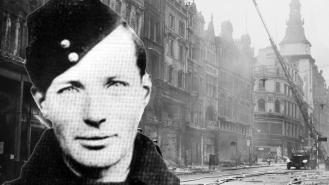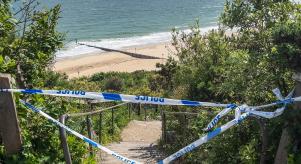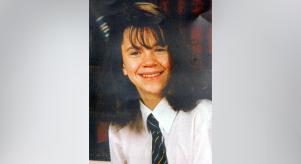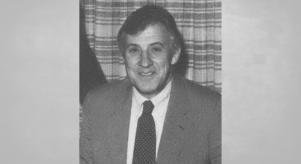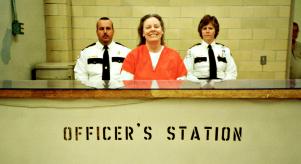
Meet the podcasters: Murder Mile UK True-Crime Podcast
Crime+Investigation is proud to partner with CrimeCon UK, a new True Crime event, coming to the UK in September 2021. As part of the show, CrimeCon has gathered together leading true crime podcasters in Podcast Row. Here fans will be able to meet the stars of their favourite shows in person.
Murder Mile UK True-Crime Podcast
Ahead of the event, Crime+Investigation is doing a series of Q&As with some of the podcasters who will be attending CrimeCon in September. In the fifth installment we spoke with Michael J Buchanan-Dunne, the host of Murder Mile UK True Crime Podcast, a weekly true-crime podcast covering 300+ untold, unsolved and long-forgotten murders,
1. How would you describe your podcast in one sentence?
Murder Mile UK True Crime Podcast features 300+ unsolved, untold and long-forgotten murders, all set within West London, with many based entirely within one square mile of Soho.
2. What makes your podcast stand out from the crowd?
Rather than simply telling the listener about the case, Murder Mile is a uniquely immersive experience, with skilful storytelling and carefully-crafted soundscapes designed to make you feel like you’re actually there. This is a very unique true-crime podcast designed to make the audience feel the emotions of the victims, to understand their pain and to sympathise with their struggle in their last moment alive. Murder Mile treats every victim as a real person, with dignity and respect, rather than just being a name, an age and a collection of injuries.
3. What first sparked your interest in True Crime?
I love biographies, I studied history and psychology at university, and I have always been fascinated by people and what makes them tick. The problem with autobiographies is that they give you a very selected/diluted view of what the author/subject wants you to think about them, hence they cherry-pick very specific aspects of their life which emphasises that idea, and they ignore any moments which do not. Biographies are really just one person’s perspective on someone else’s life (they are rarely impartial, unbiased, accurate or fair), but the act of murder is incredibly honest. Very few people plan to commit a murder, it’s usually a crime of passion or necessity (in their eyes) so the act of murder is one of the few times when someone is truly themself, acting on instinct and this is where they are at their weakest with all of their character defences down.
4. What's your favourite part of the podcasting process?
Research. To keep Murder Mile UK True Crime unique and honest, my primary source is the original declassified police investigation files held at the National Archives, as well as court and police records. It’s a real privilege to read and learn details about a person which even the person’s own family don’t know about, and to see the side of them that very people actually knew.
When I was researching my multi-part series on British serial-killer John Reginald Christie of 10 Rillington Place, I found many of the original witness statements which Reg gave to the Police. They are rarely used by biographers, as they are clearly a tissue of lies, as told by Reg to the Police, but what they do give you an incredible insight into how Reg sees himself, his victims and the act or murder itself. It’s one of the few times he was ever truly honest.
5. What do you think your fascination with True Crime has taught you in your personal life?
I’ve always lived with the philosophy of 'be kind, be polite, do no wrong and make no enemies'. It’s a simple enough rule to live by. In the majority of the cases I’ve covered, very rarely does a person start the day having decided to commit a murder or end up dead, but they do, and usually it’s over something as petty as a few pounds, a bad word, or even a dirty look. If they were to stop and take a chill-pill for a second they’d reaslise it wasn’t a cause worth fighting for. And as the old saying goes be careful how you treat people on the way up, as you’ll meet them on the way down. People have short long memories for just two things; extreme kindness and deep offense.
6. What's your favourite episode and why?
Episode 40 of Murder Mile UK True Crime Podcast: The Fascinating Life and Death of Glyndwr Michael. It was the first episode I wrote which contained no murder, no culprit, no weapon and no victim, and yet, it’s crammed full of suspense, intrigue, history and it is one of the most upsetting and uplifting stories you will ever hear. If you want to learn about the true life-story of a man who has no statues in his honour and you don’t know his name, and yet he undoubtably saved the life of you and your loved one’s, this is the episode for you. But I warn you now, it will break your heart.
7. Which case that you've featured on the podcast keeps you awake at night?
The Blackout Ripper, he was one of London’s most infamous spree-killers who attacked six women in four days in February 1942... and yet he’s practically forgotten. I wrote a very detailed ten-part series (using the original police investigation files) on the victims of Gordon Frederick Cummins, by giving a voice to those innocent women he brutally murdered, but also to try and get an insight into ‘why’ he committed such heinous crimes, as he never admitted to his guilt and gave no reason for his crimes. I continue to research his life and crimes today, hoping to find a clue to his motives, but I’m still no closer to the reason ‘why’.
8. What do you now know about podcasting that you wish you knew when you started?
Every episode of Murder Mile teaches me something new about research, writing and editing, as each week, I push myself to create something different and original. Too often, I’ve unsubscribed from podcasts as they churn out the same old tired story every week, whereas Murder Mile has taught me to be brave, inventive and creative, as every story needs to stand out and every victim deserves to be honoured.
9. What's one cold case you would like to see solved?
The Hammersmith Nudes Murders, alias Jack the Stripper; eight (known) women were found murdered and dumped in the River Thames in West London between 1959 and 1963. The original police files are still classified and held under lock and key for another twenty years. I can’t wait to dive in and find out who were the Police’s prime suspects. I debunked the conspiracy theory that it was Freddie Mills the boxer in my two-part series on Freddie Mill’s life, but I feel that it’s impossible for the victim’s families to lay their loved-ones to rest without the story being concluded and a (possible) suspect being held accountable for such atrocious crimes.
10.What reforms are needed in the world of policing and the judicial system?
A complete overhaul of the way we punish people for their crimes (through public service rather than spending 23 hours a day in a cell playing X-Box). Locking people up for their crimes doesn’t change their habits, so we need to focus on education, careers and – of course – mental health, as many people resort to crime – not through austerity – but because they don’t know any better.
11.What's your favourite True Crime podcast, documentary or TV series and why?
Neither, I love books, and one of the best books I’ve ever read is called Nightmare of Extasy by Rudolph Grey about the Z-List film director Ed Wood. Unlike most biographies which force you down an avenue of belief (insisting you must like this person or you must hate this person), it’s told as a series in snippets from interviews, so even if the different interviewees facts about Ed’s life conflict with each other, it’s left up to the reader to decide what is true, false, or misled. Real life isn’t clean and neat, so biographies shouldn’t be either.
12.If you didn’t have a True Crime podcast, what type of podcast would you have?
Storytelling, I love telling stories about real people with real lives in real situations. People are truly fascinating and (for those of us who aren’t rich, titled or ‘important’, our everyday stories are often for forgotten or glossed-over. I think that’s where a lot of true-crime podcasts and documentaries fail is that they forget that our job is to tell a coherent story – we are biographers of the dead - and to make these people as full and well-rounded characters as possible. Not to cherry-pick the goriest bits about the murder and to make crass jokes.
13.What are you most looking forward to at CrimeCon?
I’m looking forward to meeting my listeners and welcoming some new ones. I run a guided walk of Soho’s most infamous murders called Murder Mile Walks and it gives me a fantastic opportunity to meet those lovely people who have listen to and supported my podcast for years. I promise not to murder any of them... but only because CrimeCon’s in Central London and my podcast covers the West ?

